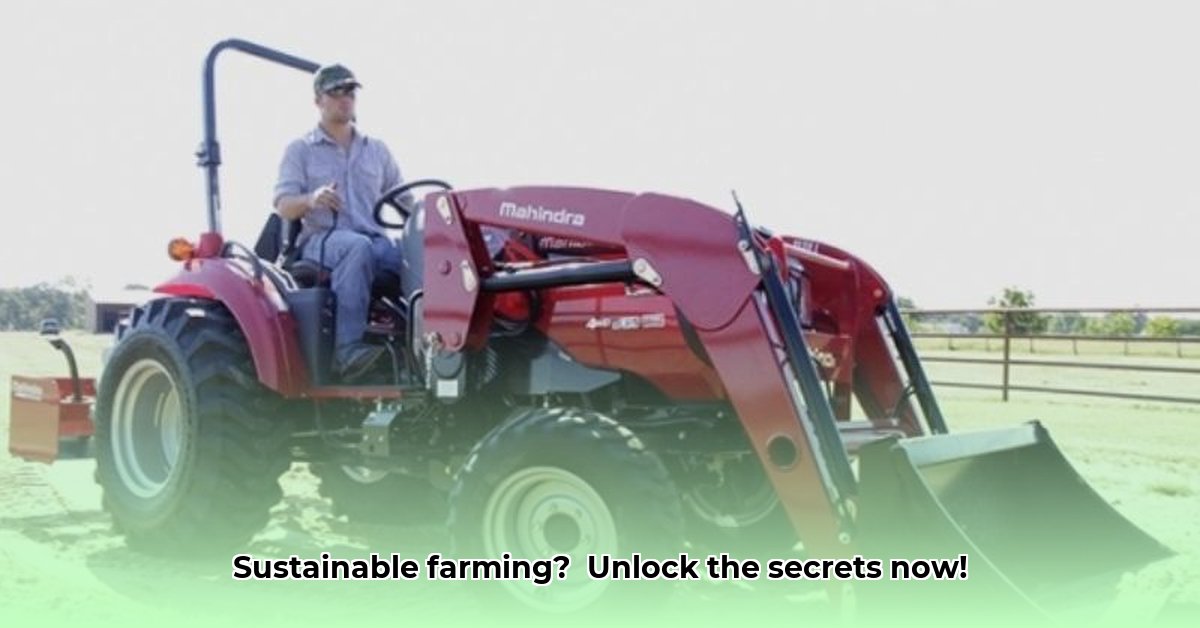
Mike Cooper Tractors and the Rise of Sustainable Agriculture
Sustainable agriculture—farming practices that minimize environmental impact while ensuring profitability—is no longer a niche concept; it's a necessity. The global demand for food is increasing, while the need to protect our planet's resources intensifies. This shift necessitates innovative agricultural technologies, and tractors play a pivotal role. While detailed information on Mike Cooper Tractors is limited, this analysis uses Mahindra tractors as a relevant case study to illuminate the broader trends and challenges in sustainable agricultural equipment. For more on tractor costs, see this helpful resource: tractor prices. This exploration will highlight the opportunities and complexities facing manufacturers like Mike Cooper and the farmers they serve. How can we ensure that sustainable farming technologies are both effective and accessible?
Mahindra Tractors: A Case Study in Sustainable Technology
Mahindra, a significant player in the global tractor market, promotes its commitment to sustainable agriculture through its mCRD (modern common rail diesel) engine technology. They claim significant greenhouse gas emission reductions – over 360 tons annually, according to their internal data. However, a critical evaluation reveals that this claim requires further scrutiny. While the reduction in greenhouse gases is noteworthy, the absence of independent verification of this data and a comprehensive environmental profile, including nitrogen oxides (NOx) and particulate matter (PM) emissions, limits the claim's credibility. "The lack of complete data generates uncertainty surrounding Mahindra's actual environmental impact," notes Dr. Anya Sharma, Environmental Scientist at the Institute for Sustainable Agriculture. Does this impressive figure truly reflect a substantial environmental benefit, or is it merely a marketing claim?
Key Takeaways from the Mahindra Case Study:
- Mahindra's mCRD technology uses a DOC (Diesel Oxidation Catalyst) instead of a DPF (Diesel Particulate Filter), resulting in simpler maintenance but potentially compromising long-term emission control.
- Independent verification of Mahindra's emission claims is necessary to assess their accuracy and reliability. This requires examining official documentation, consulting independent testing data and analyzing user feedback.
- Factors like cost, maintenance, accessibility, and future regulatory compliance must guide farmers' choices of sustainable agricultural equipment.
The success of any sustainable farming technology hinges on more than just emission reductions. Accessibility and affordability are paramount, especially for farmers in developing countries. Will this technology be effective across diverse climates and soil types? What are the long-term maintenance and repair costs? These questions reveal the complexities inherent in transitioning to sustainable practices.
Beyond Mahindra: Implications for Mike Cooper Tractors and the Broader Market
Mahindra's experience highlights the multifaceted nature of the sustainable agriculture equipment market. The success of Mike Cooper Tractors and competitors will depend crucially on several factors. Competitive pricing is essential for broad market penetration. Reliable and durable equipment that withstands diverse operating conditions is key to building farmer trust and loyalty. Accessible and skilled customer support is another vital component, ensuring timely maintenance and repairs. Additionally, educational initiatives to train farmers on effective technology use will be necessary.
Government policies also play a crucial role. Subsidies and incentives can accelerate adoption of sustainable technologies. However, stringent environmental regulations, while essential for long-term sustainability, can pose significant challenges for manufacturers and farmers alike. A collaborative effort between manufacturers, farmers, policymakers, and environmental organizations is vital for achieving sustainable agricultural practices. How can Mike Cooper Tractors leverage these factors to secure a strong market position? What are the potential risks associated with neglecting any of these crucial factors? Careful and strategic decision-making will be vital.
Conclusion: The Path Towards Sustainable Farming
The transition towards sustainable agriculture is complex but necessary. Technologies like Mahindra's mCRD system offer potential benefits, but comprehensive data and independent verification are critical for assessing their true environmental impact. For companies like Mike Cooper Tractors, success hinges on a comprehensive approach. This involves cost-effective manufacturing, resilient equipment, strong customer service, and strategic engagement with government policies. The future of sustainable farming relies on collaborative efforts—a conscious alignment of manufacturers, farmers, policymakers, and environmental advocates. The long-term consequences of our choices today will decisively shape the food security and environmental health of tomorrow. This necessitates a collaborative, forward-looking approach, ensuring that the transition to sustainable agricultural practices is both effective and equitable.